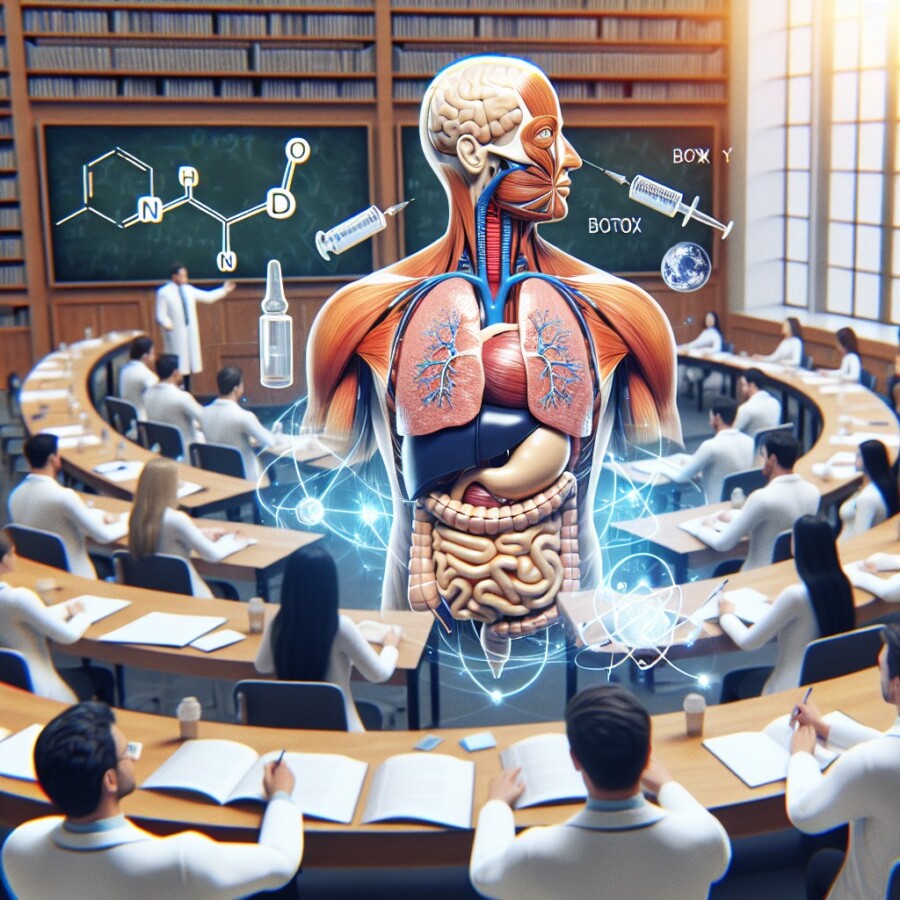Some people can’t burp because of a condition called retrograde cricopharyngeus dysfunction (R-CPD). It causes things like bloating, gurgling noises in the chest and neck, and farting. Researchers found that R-CPD not only causes physical pain but also makes people feel embarrassed, anxious, and depressed. The study showed that many doctors don’t know much about this condition, so people with R-CPD don’t get the help they need. The researchers want more research and awareness about R-CPD because it can really affect people’s lives in a bad way.
R-CPD, also known as “no burp syndrome,” happens when a muscle in the throat can’t relax, so gas can’t go up. One way to treat this is with Botox injections, which relax the muscle. A doctor named Yakubu Karagama has been using this treatment since 2016 and has seen it change his patients’ lives. But right now, Botox injections are only available as a private treatment because not enough doctors know about R-CPD.
Mr. Karagama said that not many people understand how burping works or even know that R-CPD exists. Some people have had this condition their whole lives and didn’t even know it. He said we need more money for research on R-CPD so that people can get the help they need.
The study found that doctors don’t know much about R-CPD, so people with this condition don’t get the help they need. The researchers said it’s important to learn more about R-CPD so that more people can get diagnosed and treated. They also mentioned that people with hard-to-diagnose disorders often have mental health problems, so it’s important to look at the mental health side of R-CPD too.
In conclusion, R-CPD can really affect people’s lives, causing physical pain and emotional distress. Doctors don’t know much about this condition, so people with R-CPD don’t get the help they need. We need more research and awareness about R-CPD so that more people can get diagnosed and treated.
Original news source: Non-burping can damage quality of life, researchers say (BBC)
🎧 Listen:
Slow
Normal
Fast
📖 Vocabulary:
| 1 | retrograde | Moving backward or having a backward motion or direction |
| 2 | dysfunction | A problem that stops something from working normally |
| 3 | bloating | Swelling in the stomach area because of gas |
| 4 | gurgling | A bubbling sound like water boiling |
| 5 | embarrassed | Feeling ashamed or shy |
| 6 | anxious | Feeling worried or nervous about something |
| 7 | depressed | Feeling very sad for a long time |
| 8 | syndrome | A group of symptoms that together indicate a particular disease |
| 9 | injections | Putting a liquid, like medicine, into someone’s body with a needle |
| 10 | private | Not for everyone; only for certain people who can pay or who are invited |
| 11 | awareness | Knowing about something or being conscious of it |
| 12 | diagnosed | Recognized by a doctor as having a particular illness |
| 13 | disorders | Conditions that cause parts of the body or mind to not work properly |
| 14 | distress | Extreme worry, pain, or suffering |
| 15 | research | The process of studying something to learn more about it |
Group or Classroom Activities
Warm-up Activities:
– News Summary
Instructions:
1. Divide the class into small groups.
2. Give each group a copy of the article.
3. Instruct the groups to read the article and summarize the main points in a news report format.
4. Encourage the groups to focus on the key information and important details.
5. After a designated time, have each group present their news summary to the class.
– Opinion Poll
Instructions:
1. Write the following question on the board: “Do you think more research and awareness should be done on R-CPD?”
2. Divide the class into pairs.
3. Instruct each pair to discuss their opinion on the question and come up with at least three reasons to support their view.
4. After the discussion, ask each pair to share their opinion and reasons with another pair.
5. Encourage respectful debate and discussion among the pairs.
– Vocabulary Pictionary
Instructions:
1. Write down key vocabulary words from the article on separate pieces of paper or index cards.
2. Divide the class into small groups.
3. Instruct each group to choose one person to be the artist.
4. The artist will randomly select a vocabulary word and draw a picture to represent it.
5. The rest of the group must guess the word based on the drawing.
6. Rotate the roles within each group and continue playing until all the vocabulary words have been used.
– Keyword Taboo
Instructions:
1. Write down key vocabulary words from the article on separate pieces of paper or index cards.
2. Divide the class into two teams.
3. Choose one person from each team to be the “explainer” for the round.
4. Show the explainer a vocabulary word from the article (without the team seeing it).
5. The explainer must describe the word to their team without using the word itself or any of its derivatives.
6. The team must guess the word within a designated time limit.
7. If the team guesses correctly, they earn a point. If not, the other team has a chance to steal the point.
8. Rotate the roles and continue playing until all the vocabulary words have been used.
– Future Predictions
Instructions:
1. Instruct each student to imagine they are a doctor specializing in R-CPD treatment.
2. Ask them to write a short paragraph predicting how the understanding and treatment of R-CPD will change in the future.
3. Encourage them to think about advancements in technology, research, and awareness.
4. After they have finished writing, ask volunteers to share their predictions with the class.
5. Facilitate a discussion about the different ideas and possibilities for the future of R-CPD treatment.
🤔 Comprehension Questions:
1. What is the condition called when someone can’t burp?
2. What are some symptoms of retrograde cricopharyngeus dysfunction (R-CPD)?
3. How does R-CPD affect people’s emotions?
4. Why don’t many doctors know about R-CPD?
5. How can R-CPD be treated?
6. What has been the experience of patients who received Botox injections for R-CPD?
7. Why is it important to have more research on R-CPD?
8. What other aspect of R-CPD should be considered besides the physical symptoms?
Go to answers ⇩
🎧✍️ Listen and Fill in the Gaps:
Some people can’t burp because of a condition called retrograde cricopharyngeus dysfunction (R-CPD). It causes things like bloating, gurgling (1)______ in the chest and neck, and (2)______. Researchers found that R-CPD not only causes physical pain but also makes people feel (3)______, (4)______, and depressed. The study showed that many doctors don’t know much about this condition, so people with R-CPD don’t get the help they need. The researchers want more research and awareness about R-CPD because it can really affect people’s (5)______ in a bad way.
R-CPD, also known as “no burp syndrome,” happens when a muscle in the throat can’t relax, so gas can’t go up. One way to treat this is with (6)______ injections, which relax the muscle. A doctor (7)______ Yakubu (8)______ has been using this treatment since 2016 and has seen it change his patients’ lives. But right now, Botox injections are only available as a private treatment because not enough doctors know about R-CPD.
Mr. Karagama said that not many (9)______ understand how burping (10)______ or even know that R-CPD (11)______. Some people have had this condition their whole lives and didn’t even know it. He said we need more money for research on R-CPD so that people can get the help they need.
The (12)______ found that doctors don’t know much about R-CPD, so people with this condition don’t get the help they need. The researchers said it’s important to learn more about R-CPD so that more people can get diagnosed and (13)______. They also (14)______ that people with hard-to-diagnose disorders often have mental health problems, so it’s important to look at the mental health side of R-CPD too.
In conclusion, R-CPD can really (15)______ people’s lives, causing physical pain and emotional distress. Doctors don’t know much about this condition, so people with R-CPD don’t get the help they need. We need more research and (16)______ about R-CPD so that more people can get diagnosed and treated.
Go to answers ⇩
💬 Discussion Questions:
Students can ask a partner these questions, or discuss them as a group.
1. What is retrograde cricopharyngeus dysfunction (R-CPD) and how does it affect people?
2. How do you think it would feel to have R-CPD, with symptoms like bloating and gurgling noises?
3. Do you think it’s important for doctors to be knowledgeable about R-CPD? Why or why not?
4. How would you feel if you had R-CPD and doctors didn’t know much about it, so you couldn’t get the help you needed?
5. Do you think it’s fair that Botox injections for R-CPD are only available as a private treatment? Why or why not?
6. What do you think about the idea of more research and awareness for R-CPD? Why is it important?
7. Have you ever heard of R-CPD before reading this article? Why or why not?
8. How do you think people with R-CPD feel when they find out they have this condition after having it their whole lives without knowing?
9. Do you think mental health is an important aspect to consider when studying R-CPD? Why or why not?
10. What do you think about the idea of R-CPD causing not only physical pain but also emotional distress?
11. How would you feel if you had a hard-to-diagnose disorder like R-CPD and it affected your mental health as well?
12. Do you think it’s common for doctors to not know much about certain medical conditions? Why or why not?
13. How do you think it would feel to finally get diagnosed with R-CPD after struggling with the symptoms for a long time?
14. Do you think it’s fair that people with R-CPD don’t get the help they need because doctors don’t know much about it? Why or why not?
15. What are some ways that more research and awareness for R-CPD could be promoted?
Individual Activities
📖💭 Vocabulary Meanings:
Match each word to its meaning.
Words:
1. retrograde
2. dysfunction
3. bloating
4. gurgling
5. embarrassed
6. anxious
7. depressed
8. syndrome
9. injections
10. private
11. awareness
12. diagnosed
13. disorders
14. distress
15. research
Meanings:
(A) Feeling very sad for a long time
(B) Conditions that cause parts of the body or mind to not work properly
(C) Knowing about something or being conscious of it
(D) Putting a liquid, like medicine, into someone’s body with a needle
(E) A bubbling sound like water boiling
(F) The process of studying something to learn more about it
(G) Not for everyone; only for certain people who can pay or who are invited
(H) Recognized by a doctor as having a particular illness
(I) Moving backward or having a backward motion or direction
(J) Feeling worried or nervous about something
(K) A problem that stops something from working normally
(L) Extreme worry, pain, or suffering
(M) Feeling ashamed or shy
(N) A group of symptoms that together indicate a particular disease
(O) Swelling in the stomach area because of gas
Go to answers ⇩
🔡 Multiple Choice Questions:
1. What is the condition called when someone can’t burp?
(a) No burp syndrome
(b) Retrograde cricopharyngeus dysfunction (R-CPD)
(c) Bloating disorder
(d) Gas reflux disease
2. What are some symptoms of R-CPD?
(a) Bloating, gurgling noises, and farting
(b) Sneezing, coughing, and wheezing
(c) Headaches, dizziness, and fever
(d) Stomach cramps, nausea, and vomiting
3. How does R-CPD affect people’s emotions?
(a) It makes them feel happy and carefree
(b) It has no effect on their emotions
(c) It makes them feel angry and frustrated
(d) It makes them feel embarrassed, anxious, and depressed
4. How can R-CPD be treated?
(a) With surgery
(b) With medication
(c) With Botox injections
(d) With diet and exercise
5. Why are Botox injections not widely available for R-CPD treatment?
(a) Because Botox injections are too expensive
(b) Because not enough doctors know about R-CPD
(c) Because Botox injections have harmful side effects
(d) Because Botox injections are not effective for R-CPD
6. Why is it important to learn more about R-CPD?
(a) So that doctors can make more money
(b) So that people can learn how to burp properly
(c) So that people can avoid embarrassing situations
(d) So that more people can get diagnosed and treated
7. What did the study find about doctors and R-CPD?
(a) Doctors are experts in diagnosing and treating R-CPD
(b) Doctors believe R-CPD is not a real condition
(c) Doctors don’t know much about R-CPD, so people with this condition don’t get the help they need
(d) Doctors think R-CPD is a minor issue that doesn’t require treatment
8. Why is it important to consider the mental health side of R-CPD?
(a) Because people with hard-to-diagnose disorders often have mental health problems
(b) Because R-CPD can cause physical pain and emotional distress
(c) Because mental health is more important than physical health
(d) Because R-CPD is a purely psychological condition
Go to answers ⇩
🕵️ True or False Questions:
1. Botox injections cannot be used to treat R-CPD by relaxing the muscle in the throat that is causing the issue.
2. Understanding about how burping works and the existence of R-CPD is a common issue among the general population.
3. Many doctors are not familiar with R-CPD, which means that people with this condition often do not receive the necessary help.
4. Currently, Botox injections for R-CPD are only available as a private treatment due to limited awareness among doctors.
5. More research and awareness about R-CPD is not needed to ensure that individuals with this condition can receive appropriate diagnosis and treatment.
6. This condition not only causes physical pain but also leads to feelings of embarrassment, anxiety, and depression.
7. R-CPD cannot cause symptoms like bloating, gurgling noises in the chest and neck, and farting.
8. Some people experience a condition called retrograde cricopharyngeus dysfunction (R-CPD) which prevents them from burping.
Go to answers ⇩
📝 Write a Summary:
Write a summary of this news article in two sentences.
Check your writing now with the best free AI for English writing!
Writing Questions:
Answer the following questions. Write as much as you can for each answer.
Check your answers with our free English writing assistant!
1. What is the condition called that causes people to not be able to burp?
2. Besides physical pain, what are some of the emotional effects of retrograde cricopharyngeus dysfunction (R-CPD)?
3. How can R-CPD be treated?
4. Why are Botox injections for R-CPD only available as a private treatment?
5. Why is it important for doctors to learn more about R-CPD?
✅ Answers
🤔✅ Comprehension Question Answers:
1. What is the condition called when someone can’t burp?
The condition is called retrograde cricopharyngeus dysfunction (R-CPD) or “no burp syndrome.”
2. What are some symptoms of retrograde cricopharyngeus dysfunction (R-CPD)?
Some symptoms of R-CPD include bloating, gurgling noises in the chest and neck, and farting.
3. How does R-CPD affect people’s emotions?
R-CPD can make people feel embarrassed, anxious, and depressed.
4. Why don’t many doctors know about R-CPD?
Many doctors don’t know much about R-CPD because it is not a well-known condition and there hasn’t been enough research done on it.
5. How can R-CPD be treated?
R-CPD can be treated with Botox injections, which relax the muscle in the throat that is causing the problem.
6. What has been the experience of patients who received Botox injections for R-CPD?
Patients who received Botox injections for R-CPD have seen positive changes in their lives. The treatment has helped them burp and relieved their symptoms.
7. Why is it important to have more research on R-CPD?
More research on R-CPD is important so that more people can be diagnosed and treated. It will also help raise awareness about the condition among doctors and the general public.
8. What other aspect of R-CPD should be considered besides the physical symptoms?
Besides the physical symptoms, the mental health side of R-CPD should also be considered. People with hard-to-diagnose disorders often have mental health problems, so it is important to address both aspects of the condition.
Go back to questions ⇧
🎧✍️✅ Listen and Fill in the Gaps Answers:
(1) noises
(2) farting
(3) embarrassed
(4) anxious
(5) lives
(6) Botox
(7) named
(8) Karagama
(9) people
(10) works
(11) exists
(12) study
(13) treated
(14) mentioned
(15) affect
(16) awareness
Go back to questions ⇧
📖💭✅ Vocabulary Meanings Answers:
1. retrograde
Answer: (I) Moving backward or having a backward motion or direction
2. dysfunction
Answer: (K) A problem that stops something from working normally
3. bloating
Answer: (O) Swelling in the stomach area because of gas
4. gurgling
Answer: (E) A bubbling sound like water boiling
5. embarrassed
Answer: (M) Feeling ashamed or shy
6. anxious
Answer: (J) Feeling worried or nervous about something
7. depressed
Answer: (A) Feeling very sad for a long time
8. syndrome
Answer: (N) A group of symptoms that together indicate a particular disease
9. injections
Answer: (D) Putting a liquid, like medicine, into someone’s body with a needle
10. private
Answer: (G) Not for everyone; only for certain people who can pay or who are invited
11. awareness
Answer: (C) Knowing about something or being conscious of it
12. diagnosed
Answer: (H) Recognized by a doctor as having a particular illness
13. disorders
Answer: (B) Conditions that cause parts of the body or mind to not work properly
14. distress
Answer: (L) Extreme worry, pain, or suffering
15. research
Answer: (F) The process of studying something to learn more about it
Go back to questions ⇧
🔡✅ Multiple Choice Answers:
1. What is the condition called when someone can’t burp?
Answer: (b) Retrograde cricopharyngeus dysfunction (R-CPD)
2. What are some symptoms of R-CPD?
Answer: (a) Bloating, gurgling noises, and farting
3. How does R-CPD affect people’s emotions?
Answer: (d) It makes them feel embarrassed, anxious, and depressed
4. How can R-CPD be treated?
Answer: (c) With Botox injections
5. Why are Botox injections not widely available for R-CPD treatment?
Answer: (b) Because not enough doctors know about R-CPD
6. Why is it important to learn more about R-CPD?
Answer: (d) So that more people can get diagnosed and treated
7. What did the study find about doctors and R-CPD?
Answer: (c) Doctors don’t know much about R-CPD, so people with this condition don’t get the help they need
8. Why is it important to consider the mental health side of R-CPD?
Answer: (a) Because people with hard-to-diagnose disorders often have mental health problems
Go back to questions ⇧
🕵️✅ True or False Answers:
1. Botox injections cannot be used to treat R-CPD by relaxing the muscle in the throat that is causing the issue. (Answer: False)
2. Understanding about how burping works and the existence of R-CPD is a common issue among the general population. (Answer: False)
3. Many doctors are not familiar with R-CPD, which means that people with this condition often do not receive the necessary help. (Answer: True)
4. Currently, Botox injections for R-CPD are only available as a private treatment due to limited awareness among doctors. (Answer: True)
5. More research and awareness about R-CPD is not needed to ensure that individuals with this condition can receive appropriate diagnosis and treatment. (Answer: False)
6. This condition not only causes physical pain but also leads to feelings of embarrassment, anxiety, and depression. (Answer: True)
7. R-CPD cannot cause symptoms like bloating, gurgling noises in the chest and neck, and farting. (Answer: False)
8. Some people experience a condition called retrograde cricopharyngeus dysfunction (R-CPD) which prevents them from burping. (Answer: True)
Go back to questions ⇧















